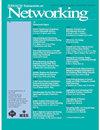量子-经典混合系统的时空多元动态流
IF 3.6
3区 计算机科学
Q2 COMPUTER SCIENCE, HARDWARE & ARCHITECTURE
引用次数: 0
摘要
在嘈杂的中等规模量子(NISQ)时代,量子比特(qubit)的可用性有限,因此,用量子计算设备立即替换现有网络架构中的所有组件可能不现实。因此,实现量子-经典混合系统被认为是一种有效的策略。在混合量子-经典系统中,量子计算设备可用于计算密集型应用,例如动态环境中的大规模调度。此外,最流行的网络应用程序之一是高级社交媒体服务,如metaverse。据此,本文提出了一种先进的量子-经典混合系统中的多元宇宙动态流算法。为此,本文提出的算法分为三个阶段。第一阶段,利用物理空间的空间调度观测设备进行三维点云数据采集,在元宇宙服务器中构建虚拟多元空间。这是针对动态情况下的大规模调度,即利用基于量子多智能体强化学习的调度将调度维数降为对数尺度。对于第二阶段,设计了一个临时低延迟元空间服务器的处理器调度器,用于通过带有硬实时约束的修改bin-packing呈现具有区域知名度的多个虚拟元空间的内容分配。最后,提出了一种基于Lyapunov优化理论的高质量、差异化和稳定化元空间内容呈现算法。我们的性能评估结果验证了所提出的时空算法在各个方面优于混合量子经典系统的基准。本文章由计算机程序翻译,如有差异,请以英文原文为准。
Spatio-Temporal Multi-Metaverse Dynamic Streaming for Hybrid Quantum-Classical Systems
According to the challenges related to the limited availability of quantum bits (qubits) in the era of noisy intermediate-scale quantum (NISQ), the immediate replacement of all components in existing network architectures with quantum computing devices may not be practical. As a result, implementing a hybrid quantum-classical system is regarded as one of effective strategies. In hybrid quantum-classical systems, quantum computing devices can be used for computation-intensive applications, such as massive scheduling in dynamic environments. Furthermore, one of most popular network applications is advanced social media services such as metaverse. Accordingly, this paper proposes an advanced multi-metaverse dynamic streaming algorithm in hybrid quantum-classical systems. For this purpose, the proposed algorithm consists of three stages. For the first stage, three-dimensional (3D) point cloud data gathering should be conducted using spatially scheduled observing devices from physical-spaces for constructing virtual multiple meta-spaces in metaverse server. This is for massive scheduling over dynamic situations, i.e., quantum multi-agent reinforcement learning-based scheduling is utilized for scheduling dimension reduction into a logarithmic-scale. For the second stage, a temporal low-delay metaverse server’s processor scheduler is designed for region-popularity-aware multiple virtual meta-spaces rendering contents allocation via modified bin-packing with hard real-time constraints. Lastly, a novel dynamic dynamic streaming algorithm is proposed for high-quality, differentiated, and stabilized meta-spaces rendering contents delivery to individual users via Lyapunov optimization theory. Our performance evaluation results verify that the proposed spatio-temporal algorithm outperforms benchmarks in various aspects over hybrid quantum-classical systems.
求助全文
通过发布文献求助,成功后即可免费获取论文全文。
去求助
来源期刊

IEEE/ACM Transactions on Networking
工程技术-电信学
CiteScore
8.20
自引率
5.40%
发文量
246
审稿时长
4-8 weeks
期刊介绍:
The IEEE/ACM Transactions on Networking’s high-level objective is to publish high-quality, original research results derived from theoretical or experimental exploration of the area of communication/computer networking, covering all sorts of information transport networks over all sorts of physical layer technologies, both wireline (all kinds of guided media: e.g., copper, optical) and wireless (e.g., radio-frequency, acoustic (e.g., underwater), infra-red), or hybrids of these. The journal welcomes applied contributions reporting on novel experiences and experiments with actual systems.
 求助内容:
求助内容: 应助结果提醒方式:
应助结果提醒方式:


